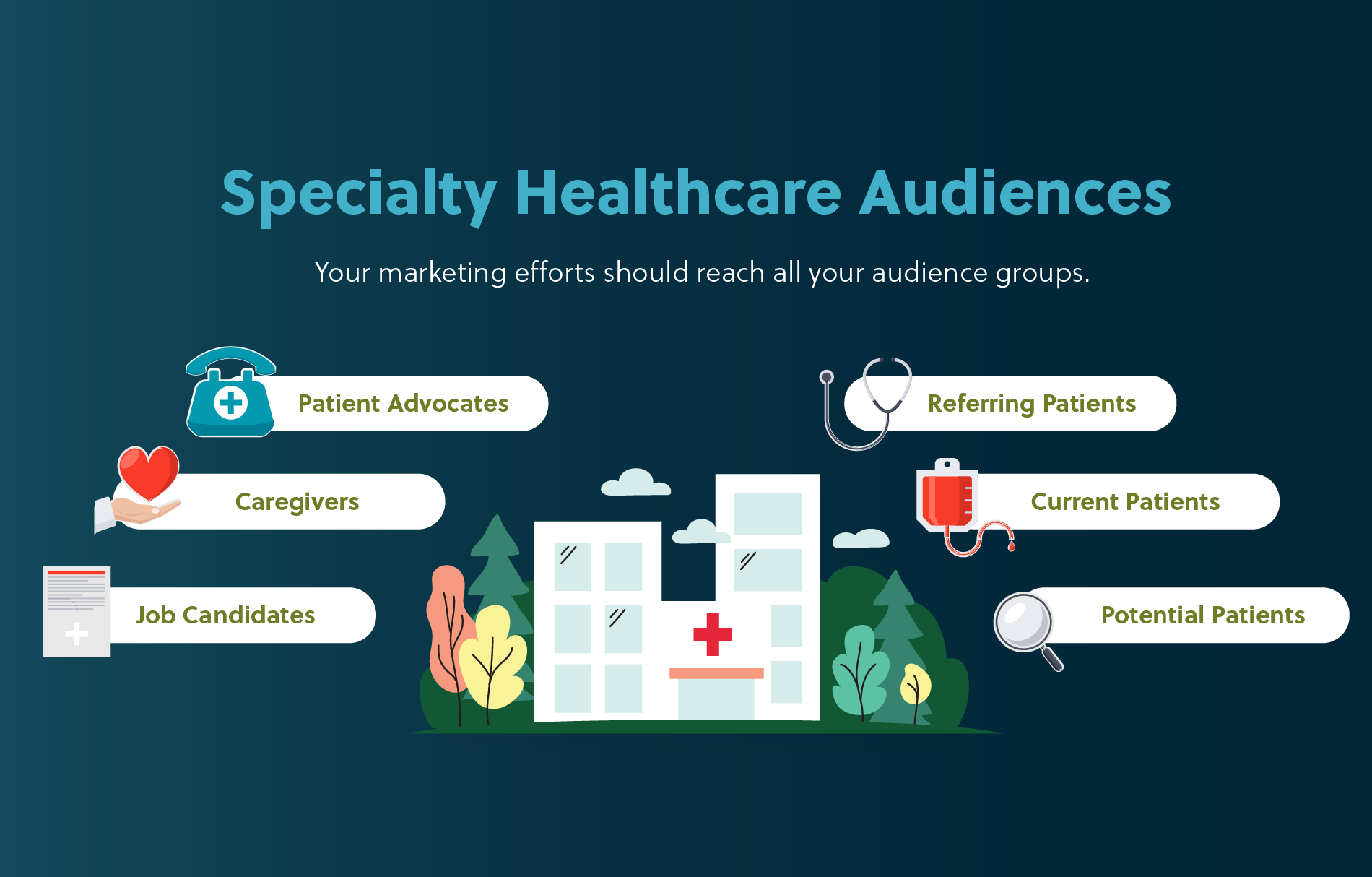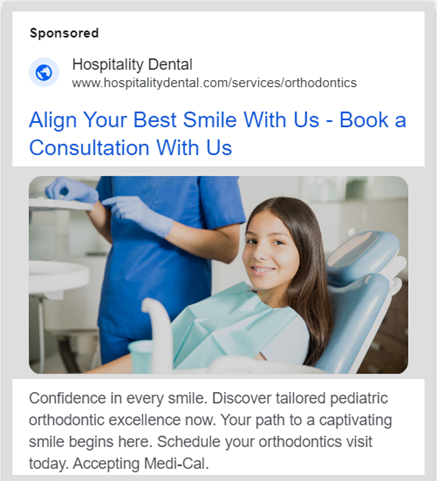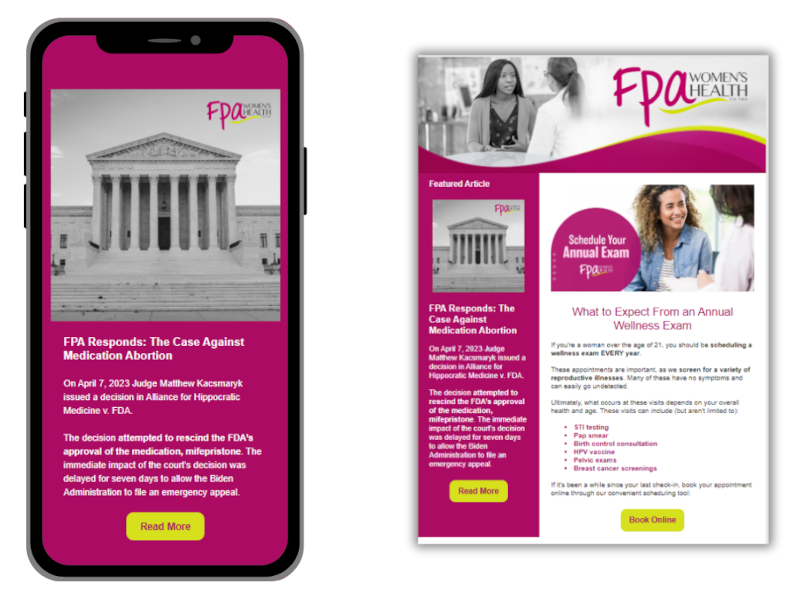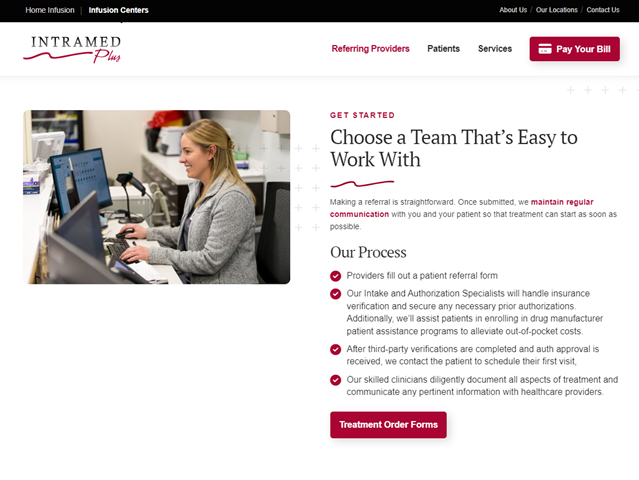Healthcare marketing is tough enough, but when you're a smaller specialty clinic, it can feel like a Herculean task.
Competing with large healthcare systems and hospitals with entire departments dedicated to marketing can be daunting, especially when your resources are limited (or non-existent).
But here's the good news: your size can be one of your greatest assets.
Specialty healthcare clinics have a unique advantage: They can create content and patient experiences that are more personalized, focused, and authentic. Unlike the big systems, you have the flexibility to tailor your approach and connect with patients on a deeper level.
Whether you decide to partner with a healthcare marketing agency or manage everything in-house, this guide will help you develop a holistic marketing plan that sets you apart from the competition.
**Just need a marketing plan and don’t want to read this entire blog post? We can help now!**
Inside this guide:
- Defining Specialty Healthcare
- Before You Start: Know Your Audience
- Building Your Healthcare Marketing Plan
- Bringing it All Together
Defining Specialty Healthcare
Before diving into the nuts and bolts of building a marketing plan, let’s clarify what we mean by "specialty healthcare."
In this blog, we'll be referring to independent clinics, practices, and businesses that serve a specific medical need for patients, rather than a health system or network. While it includes medical specialists, it also encompasses a range of fields, such as:
- Drug infusion services
- Pain management
- Chiropractic care
- Wound care
- At-home medical care
- Dialysis
- Fertility treatment
- Optometry
- Massage therapy
These businesses lack the supports that come with hospitals and major health systems, and are typically responsible for their own marketing (digital and otherwise). That can be a challenge for owners and managers more comfortable with the medical side of the business. It's also why many choose to work with a healthcare marketing agency that knows the medical industry—but you can do much of this work as well with a little time and dedication.
Before You Start: Know Your Audience
Hippocrates, the man behind the famous medical oath, is quoted as saying, “It’s far more important to know what person the disease has than what disease the person has.”
It’s a great reminder for both medical practitioners and specialty healthcare marketers that we need to know the person we’re talking to. While it can be tempting (and easier) to lump your audiences into “patients” and “providers,” there are many more groups that need to hear your marketing messages—at least six, in fact:

Perhaps the toughest challenge facing today’s specialty healthcare marketers is developing a strategy that reaches all of them.
Let’s break them down and the kinds of content that may resonate most, so we can understand how they’ll play into your overall marketing strategy.
Patient Advocates
These are the devoted family members and friends who take on the vital role of researching and advocating on behalf of patients. They’re often hidden players in the patient’s decision-making process. Your messaging should empower them with clear, trustworthy information. They’ll want to see reviews, case studies, and comprehensive provider bios.
Referral Sources
Physicians and healthcare providers are the gatekeepers of patient referrals. When they’re interacting with your clinic, they want to see a detailed explanation of your services to decide if you align with their patients’ needs. These groups also appreciate a straightforward, and often digital, referral process.
In our recent website redesign for Intramed Plus, we told providers exactly what to expect when referring a patient for infusion treatment. Clear, detailed instructions like these make the provider less likely to call your office in search of the next step.
Caregivers
Whether a caregiver is the patient’s relative or a home nurse, caregivers are pivotal in treatment success. Providing them with instructional, supplementary information—like digital resource libraries and handouts—can create a strong bond of trust, positioning your clinic as an essential partner in care.
Potential Patients
Whether they’re managing a new diagnosis or switching routine providers, these individuals are looking for clarity and reassurance.
Providing them with accessible, detailed information—such as treatment options, patient testimonials, and simple explanations of care processes—can ease their minds and research process.
Our paid Google Ads for Hospitality Dental strike an encouraging tone. From the ad, users are taken to a landing page to explore detailed treatment options and view patient testimonials.

Job Candidates
From seasoned experts to emerging talent, potential job candidates are evaluating your clinic for its culture, values, and career growth opportunities. Provide them with insights into your work environment through employee testimonials, vibrant imagery, and a detailed About Us section on your website.
Current Patients
Your current patients benefit from continued support and communication. Targeted email marketing campaigns, personalized health tips, and updates on new treatments can keep them informed and engaged. By delivering content they find relevant and useful, you strengthen their loyalty and encourage a lasting relationship with your clinic.
Building Your Healthcare Marketing Plan
Specialty healthcare marketing may be nuanced, but it relies on many of the same tools and strategies we use across various industries, whether B2B companies or B2C ecommerce brands. The key is to tailor these strategies to fit the unique audiences in your field.
A successful specialty healthcare marketing plan is typically built around the following components:
- Search Engine Optimization (SEO)
- Content Marketing
- Social Media Marketing
- Video Marketing
- Email Marketing
Each of these channels plays a crucial role in your overall marketing strategy. The content you create and distribute across these platforms must be authoritative, trustworthy, and informative. Healthcare topics can be sensitive or even intimidating for your audience, so your messaging needs to not only educate but also guide them toward taking the next step—ideally with the support of your clinic or practice.
Now let’s break down each of these channels to better understand how to use them effectively in your marketing efforts.

Search Engine Optimization (SEO)
You might wonder, "Why should specialty healthcare clinics worry about SEO if most of our patients come through referrals?" While it's true that many clinics rely heavily on referrals, not all do. Those that are new or looking to grow depend on organic search visibility to attract patients. Even established practices can benefit from strong SEO, particularly in competitive markets with major health systems that offer services across many specialties.
For example, a private rehabilitation clinic may find that major hospitals in their area primarily refer patients to their own affiliated clinics. In such cases, being easily found online can make a big difference in winning future referrals. If a patient or family member starts their search online, you want your clinic to be among the first options they see.
The good news is that Google prioritizes sources that demonstrate expertise, authority, and trustworthiness—qualities that specialty clinics inherently possess. By prioritizing common SEO techniques such as citing credible sources and sharing your expertise through content, you can position your clinic as a trusted resource. This not only boosts your SEO performance, but also helps establish your clinic as a go-to option for patients and referring doctors alike.
Moreover, people are prefer to link to authoritative sources, which can make building backlinks easier for specialty healthcare providers. Backlinks are a crucial component of SEO, as they signal to search engines that your site is a credible and valuable resource. Consider authoring guest posts, collaborating with other healthcare experts, or even getting featured in reputable industry publications to build these valuable links.
Learn More: 6 Steps to Creating SEO-Friendly Landing Pages for Your Healthcare Website
Content Marketing
Great content marketing is all about delivering high-quality content that answers your audience's most pressing questions. In the realm of specialty healthcare, this becomes even more critical. Patients and their families are searching for authoritative, trustworthy answers to some of their most important and sensitive questions, which is why content quality is paramount.
Google’s algorithms place increased scrutiny on pages serving up financial and medical content—often referred to as "Your Money or Your Life" (YMYL) pages. This means your content not only needs to be accurate and reliable but also expertly crafted to rank well in search results.
Perhaps the biggest secret to success in healthcare content marketing is to find your niche and dive deeply into it. Think about the specific questions your patients or fellow practitioners frequently ask and answer those questions across your content channels. Whether it's through a regularly updated blog, well-crafted website copy, or informative email and print newsletters, your content should strive to be educational and accessible.
For example, educational content can help potential patients better understand a diagnosis or treatment options, while your clinical success stories can demonstrate the quality of care patients can expect. Similarly, informative videos and patient testimonials build credibility and trust with new audiences, encouraging engagement.
Social Media Marketing
Social media marketing in the specialty healthcare space often takes an educational approach, which makes sense. It's a powerful tool for reaching and educating patients on topics that matter most to them. But don’t limit yourself to just educational content. Social media offers a versatile platform to connect with your audience in a variety of ways, helping you build a well-rounded presence that extends beyond patient education.
Consider using your social channels to:
- Introduce your practice and staff: Humanize your brand by showcasing the people behind the care. Share staff spotlights, behind-the-scenes looks at your clinic, and personal stories that resonate with your audience.
- Highlight your services: Use social media to discuss and demonstrate the specific services you offer. This not only informs potential patients but also reinforces your specialty focus.
- Raise public health awareness: Engage with your community by sharing relevant public health information. Whether it’s a local heatwave or an outbreak of illness, addressing issues that are top-of-mind for your audience builds trust.
- Issue important announcements: Keep your followers informed with timely updates, whether it’s about new services, changes in operation hours, or upcoming events.
- Share patient success stories: When possible and with proper consent (see our section on HIPAA compliance), share patient testimonials and success stories. These stories can be incredibly powerful in building credibility.
To keep your social media efforts organized and consistent, develop an editorial calendar. This allows you to plan out your weekly or monthly posts, ensuring you maintain a steady stream of content without the stress of last-minute brainstorming—a social killer for many small medical practices. An editorial calendar also helps you balance the types of content you share, so your social presence remains dynamic and engaging.
For specialty healthcare clinics focused on generating new patient leads, consider investing in social media advertising. Paid ads on platforms like Facebook, Instagram, and Twitter can significantly boost your reach and conversions, leading to a higher return on investment (ROI). These platforms offer advanced targeting options, enabling you to reach the exact audience you want—whether it’s based on location, demographics, or specific health interests.
Learn More: How to Make Social Media Work in the Medical Field
(And check out these social media tips from Informatics' top dog, Pip.)
Video Marketing
Video is an essential marketing tool in healthcare today, thanks to its ability to educate and convert viewers into patients. Research shows that 72% of people prefer to learn about a product or service by watching a video, and 95% of viewers retain the information they see in a video, compared to only 10% who read the same content in an article.
For specialty healthcare practices, video can be a game-changer. What types of videos should you create?
- Explainer Videos: Break down complex conditions, treatment options, and preventative care measures. Simple animations and clear language can make these topics more digestible.
- Meet the Physician: Introduce your healthcare providers, highlighting their specialties and approach to patient care. This personalizes your practice and builds trust.
- Service Demonstrations: Showcase your healthcare services, especially useful in the age of telehealth, where a visual explanation can be more effective than a verbal one.
- Procedure Explainers: Use video to walk patients through what to expect during a procedure, which can alleviate anxiety and build confidence in your services.
- Live Q&A Sessions: Engage with your audience by hosting live or pre-recorded Q&A sessions, addressing common patient concerns directly.
- Facility Tours: Give potential patients a virtual tour of your practice, showcasing your environment, staff, and services.
- Patient Testimonials: Share success stories with proper consent to build credibility and demonstrate the value of your care.
Getting into video doesn’t have to be daunting; the advent of the pro-grade iPhone has made it easier than ever to capture great video. It can be as simple as having your staff or doctors produce Facebook Live or Instagram Live videos on the fly. They can talk about new products or services, share health tips, or answer questions in real-time as they’re submitted by viewers. This approach brings a level of immediacy and authenticity that resonates with many patients.
If your brand needs a more polished look for its videos, or even just select videos (like those shown as a TV ad or to accept an award), a media production company like Informatics can help with a broadcast-grade studio, professional equipment, and full post-production capabilities.
Learn More: A Healthcare Guide to HIPAA Compliant Video Marketing
Email Marketing
Email marketing is an excellent choice for specialty healthcare clinics because of the direct, trusted connection you already have with your patients. Unlike many other businesses, where email can feel intrusive or unwelcome, your messaging is likely to be appreciated and valued in your patients' inboxes.
At a minimum, you should plan on sending monthly e-newsletters to your patient list. These newsletters can cover many of the same topics as your social media channels but with more depth. For example, our newsletters for FPA Women's Health link out to blog posts on their website, share detailed insights about their services, and share educational content that helps patients better understand their health.
Remember, every piece of content you include should provide value to your patients, whether it's educational information or an introduction to a new service they might be interested in. Avoid self-serving or overly promotional content, as it can quickly erode trust.

(Check out our monthly newsletter as an example of adding value that doesn't feel promotional.)
Email can serve as a kind of connective tissue, tying all of your different channels together. Don’t assume that just because you posted something on social media, your patients saw it or remembered it. Email can act as a helpful "digest," delivering must-see information straight to their inboxes and ensuring that important messages aren't missed.
By strategically using email marketing, your specialty healthcare clinic can strengthen patient relationships, enhance engagement, and ensure that your important messages are received and acted upon.
Learn More: Medical Professionals: 5 Features of Your Next E-Blast

Bringing it All Together
Now that you understand the various components that go into a successful specialty healthcare marketing plan, it’s time to weave them together into an actionable, sustainable plan for your clinic. Here’s how to bring it all together.
1. Set Your Goals
Every marketing channel you use should have specific, measurable goals. Whether it’s increasing patient engagement on social media, boosting new patient website traffic through SEO, or growing your email subscriber list, setting clear objectives from the outset is crucial.
Determine which metrics are most important to you and track their progress, preferably using a Looker Studio dashboard. By doing so, you’ll be able to track your successes and identify areas for improvement as the year progresses.
2. Approve Your Budget
Budgeting is an essential part of creating your overall marketing strategy. Your budget will determine how much you can invest in areas like social media advertising, Google AdWords, video production, and email campaigns.
Once your budget is approved, it’s crucial to strategically allocate funds to the channels that align most closely with your specific goals.
For example, if brand awareness is a priority, you might allocate more to video production and social media advertising. On the other hand, if driving conversions is your main focus, a larger portion of the budget might go toward Google search ads and email campaigns.
If your budget allows, consider hiring additional team members, a healthcare marketing agency or even a seasonal intern to help manage your marketing efforts.
A well-staffed team can provide the expertise and bandwidth needed to fully leverage your marketing channels (especially in a busy field like healthcare), ultimately driving better results.
3. Develop a Calendar
A master editorial calendar is your roadmap for staying organized across multiple marketing channels—especially in an industry as busy as healthcare. Use tools like Excel or Google Sheets to create a calendar that outlines your quarterly goals, tactics, and important dates such as holidays or clinic events. This calendar will keep you on track, prevent writer’s block, and ensure that all the moving parts of your strategy are aligned.
4. Assign Roles
If you have a marketing or communications team, assigning roles is the final step to ensure everything gets done efficiently. Clearly define who is responsible for each aspect of your marketing plan, whether it’s managing social media, writing content, or analyzing SEO performance. If you’re a one-person team, make sure your strategy is manageable by focusing on the most impactful channels and being realistic in what you can handle. And don’t forget, involving co-workers in tasks like guest blogging can help lighten the load and bring fresh perspectives to your content.
Learn More: 7 Steps to Creating Your Digital Marketing Strategy
Once you’ve completed these steps, you’ll be well-equipped to dive into your new marketing strategy with confidence. By setting clear goals, budgeting wisely, staying organized, and assigning responsibilities, your specialty healthcare clinic can build a robust, sustainable marketing plan that drives growth and success.
If you need help developing or managing your healthcare marketing plan, don’t feel like you have to go it alone. As a trusted healthcare marketing agency, we can help you build a strategy that accomplishes your specific goals and elevates your brand. Reach out to us today for a free consultation!
Ready to transform your healthcare marketing?
Our expert digital marketers can build a high-impact plan that delivers patients and referrals.


